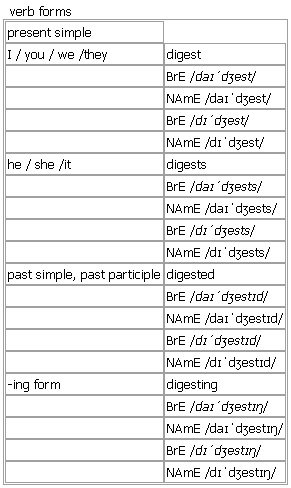 digest
digest

di·gest [digest digests digested digesting] verb, noun
verb BrE [daɪˈdʒest] ; NAmE [daɪˈdʒest] BrE [dɪˈdʒest] ; NAmE [dɪˈdʒest]
1. transitive, intransitive ~ (sth) when you digest food, or it digests, it is changed into substances that your body can use
•Humans cannot digest plants such as grass.
•You should allow a little time after a meal for the food to digest.
2. transitive ~ sth to think about sth so that you fully understand it
•He paused, waiting for her to digest the information.
Verb forms: 
Word Origin:
late Middle English: from Latin digest- ‘distributed, dissolved, digested’, from the verb digerere, from di- ‘apart’ + gerere ‘carry’; the noun from Latin digesta ‘matters methodically arranged’, from digestus ‘divided’, from digerere.
Example Bank:
•He has to avoid fat because his body can't digest it.
•Some foods are digested more easily than others.
•The news was hard to digest.
•The parent bird partially digests food in its crop.
•partially digested food
noun BrE [ˈdaɪdʒest] ; NAmE [ˈdaɪdʒest]
a short report containing the most important facts of a longer report or piece of writing; a collection of short reports
•a monthly news digest
Word Origin:
late Middle English: from Latin digest- ‘distributed, dissolved, digested’, from the verb digerere, from di- ‘apart’ + gerere ‘carry’; the noun from Latin digesta ‘matters methodically arranged’, from digestus ‘divided’, from digerere.
|
|
